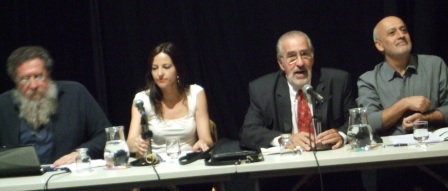Revolution or restauration of the status quo in the Middle East?

Is it revolution or the restoration or renovation of the status quo? That was the gest of the panel discussion yesterday at the Centro Cultural de la Cooperación in Buenos Aires. The extremely complex situation in the Middle East was also considered as a tragic aftermath of the Cold War.
The fall of the former Soviet Union brought promises of democracy and prosperity among the world’s leading industrial powers, but the Middle East was clearly and purposely left out of that process, according to Juan Gabriel Tokatlian of the Torcuato Di Tella university.
Not only the Middle East. We might add also Africa and Latin America, although the ostracizing of Islamic countries was certainly a more top-to-bottom policy. Washington’s notion of pumping in dollars and other forms of support to gain the sympathy of dictatorships or autocratic regimes--an after taste of the Cold War--has been a constant in countries such as Egypt and Saudi Arabia.
Nevertheless, speakers considered that the revolts are due not only to the repressive policies in Mid East countries: their draconic application of western inspired market economics has led to massive unemployment and the enormous enrichment of the uppercrust.
Carlos Escudé of UCEMA pointed out what he considered clear contradictions in Washington’s foreign policy. Democracy and human rights for the U.S. and its closest allies, while openly supporting ruthless regimes in oil rich Arabic nations.
The case of Egypt is of special interest. From the timid pan-arabismo of Nasser, it very soon became the body guard of U.S. interests in the area and in view of its geopolitical importance the Pentagon pumped record amounts of weapons and military aid to Nasser’s succesors, such as Mubarak--recently overthrown in the wake of massive protests.
That massive aid, according to Escudé, has amounted to a wide-angle bribing of the top echelons of Egypt’s military officers. And it was the military that kept Murarak in power, the military that decided it was time for him to step down. If it were not for the juggling for those enormous aid benefits, Escudé claimed, the repression would have been much more severe. The impression is that a change in figures at the top has been made, some concessions to popular demands granted, as a ruse to restore the status quo and prevent a genuine democratic revolution from taking place.
The yes-no, no-yes discussions in Europe and the U.S. concerning whether to intervene in Libia, or whether to establish a sort of air vigilance to supposedly favor those fighting against Kadafi was seen as a reflection of deep seated confusion related to political and economic interests.
Italy, which has historically had close ties with Libia and receives a generous portion of oil from Kadafi, attempts to support both the dictator and the opposition, fearing not only for its interests in Libia: a wave of immigration would indeed be very embarassing for Rome.
Germany and a number of other European countries are tired of the endless entanglements in Irak and Afghanistan and thus are whistling caution. France, on the contrary, has expressed its open support for the opposition. Should they loose, that could led to strong future tension with Kadafi.
The U.S. has adopted a cat and mouse approach, no doubt due to its strong suspicion of the opposition’s possible inclination towards radical islamic causes. In fact, the stronghold of opposition to Kadafi are said to have strong sympathy for radical islamic forces.
There was general agreement, however, that a victory of kadafi would represent a severe setback for the entire region and for the democratic protest movements in the area. The best that could be hoped for would be an initial change in the repressive order in the region, making possible a long term evolution towards more democratic forms of social organization.
In a word, Washington’s dilemma is how to refurbish obviously hated and outmoded dictatorships and authoritarian regimes in the Middle East with white-washed governments able to guarantee the status quo and the flow of oil to the U.S. and the West.
0 comentarios